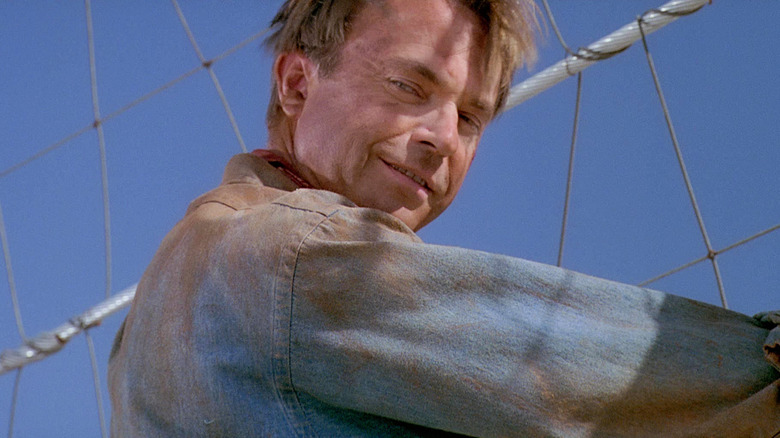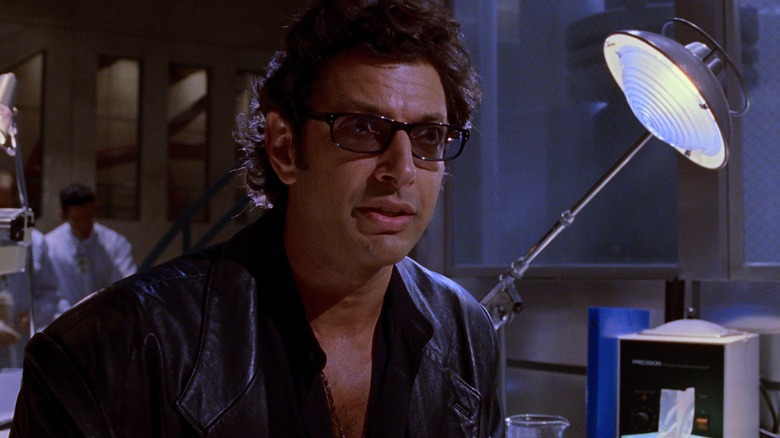Michael Crichton's Jurassic Park Book Sparked A Major Hollywood Bidding War
Steven Spielberg's blockbuster film adaptation of "Jurassic Park" turns 30 today, but just as its tagline promised "an adventure 65 million years in the making," the story of "Jurassic Park" goes back further than the summer of 1993. For a time, Spielberg's film was the highest-grossing one ever released, thanks in part to its irresistible concept of escaped dinosaurs running amok in an island theme park. Before it became a box-office powerhouse, however, "Jurassic Park" was a bestselling Michael Crichton novel, and before the book was even published, it sparked a major Hollywood bidding war.
That was the very thing Crichton tried to avoid. As the American Film Institute's catalog entry on "Jurassic Park" notes, Crichton was already entertaining offers from four different movie studios for "Jurassic Park" in May 1990, six months before his novel hit bookstores. According to Indiewire, the author had set the price for the movie rights at a firm $1.5 million so he "could assess whatever interest might arise with fiscal dispassion."
Crichton was less concerned with which studio could offer the most money, and more concerned with which offer came packaged with the best talent. In addition to Spielberg and Universal Pictures, Crichton had offers from Columbia/Tri-Star with "Superman" director Richard Donner, Warner Bros. with "Batman" director Tim Burton, and Twentieth Century Fox with "Gremlins" director Joe Dante.
Spielberg, though, had already seen an early galley version of Crichton's "Jurassic Park" manuscript. For him, the end was never in doubt, though Crichton's talent agency, CAA, had other ideas.
"The agency got ahold of it," Spielberg explained, "and they, of course, encouraged a bidding war, even though Michael had kind of promised me the book privately. Before long, it had been sent out to every studio in town, and the bidding was fast and furious."
Money and science
"Jurassic Park" sold to Steven Spielberg and Universal Pictures, of course, and Michael Crichton wrote the script's first draft for an additional $500,000. Maybe part of the reason Crichton was able to navigate the situation so well was that he already had experience in Hollywood going back decades.
Twenty years before "Jurassic Park" hit theaters, Crichton himself wrote and directed "Westworld," starring Yul Brynner. The movie, which turns 50 this August, broke new ground with its special effects, just as "Jurassic Park" would, and it was predicated on a similar idea of a money-making theme park venture gone wrong, with killer robot gunslingers substituted for the T-Rex and velociraptors.
Though Spielberg insisted the dinosaurs were animals acting on their instincts, not "monsters," Crichton's techno-thriller novels often did explore the monstrous potential of science and technology, as warned against by the immortal Ian Malcolm quote, "Your scientists were so preoccupied with whether they could, they didn't stop to think if they should."
"Jurassic Park" was over a month into its theatrical run when another commercially successful Crichton adaptation, "Rising Sun," starring Wesley Snipes and Sean Connery, joined it at the box office. The Crichton movie adaptations would come hard and fast after that, with "Disclosure," "Congo," "The Lost World: Jurassic Park," "Sphere," and "The Thirteenth Warrior" (based on "Eaters of the Dead") all landing before the turn of the millennium.
Like fellow bestselling author John Grisham, Crichton's book sales in the 1990s were boosted by films based on his novels, but during this time, he also created the hit TV series "ER." Though Crichton wouldn't live to see it, "Westworld" also became an HBO series, facing cancellation last year the same month a real-life AI, ChatGPT, was introduced to the world. We're still waiting on the cloned dinosaurs.

